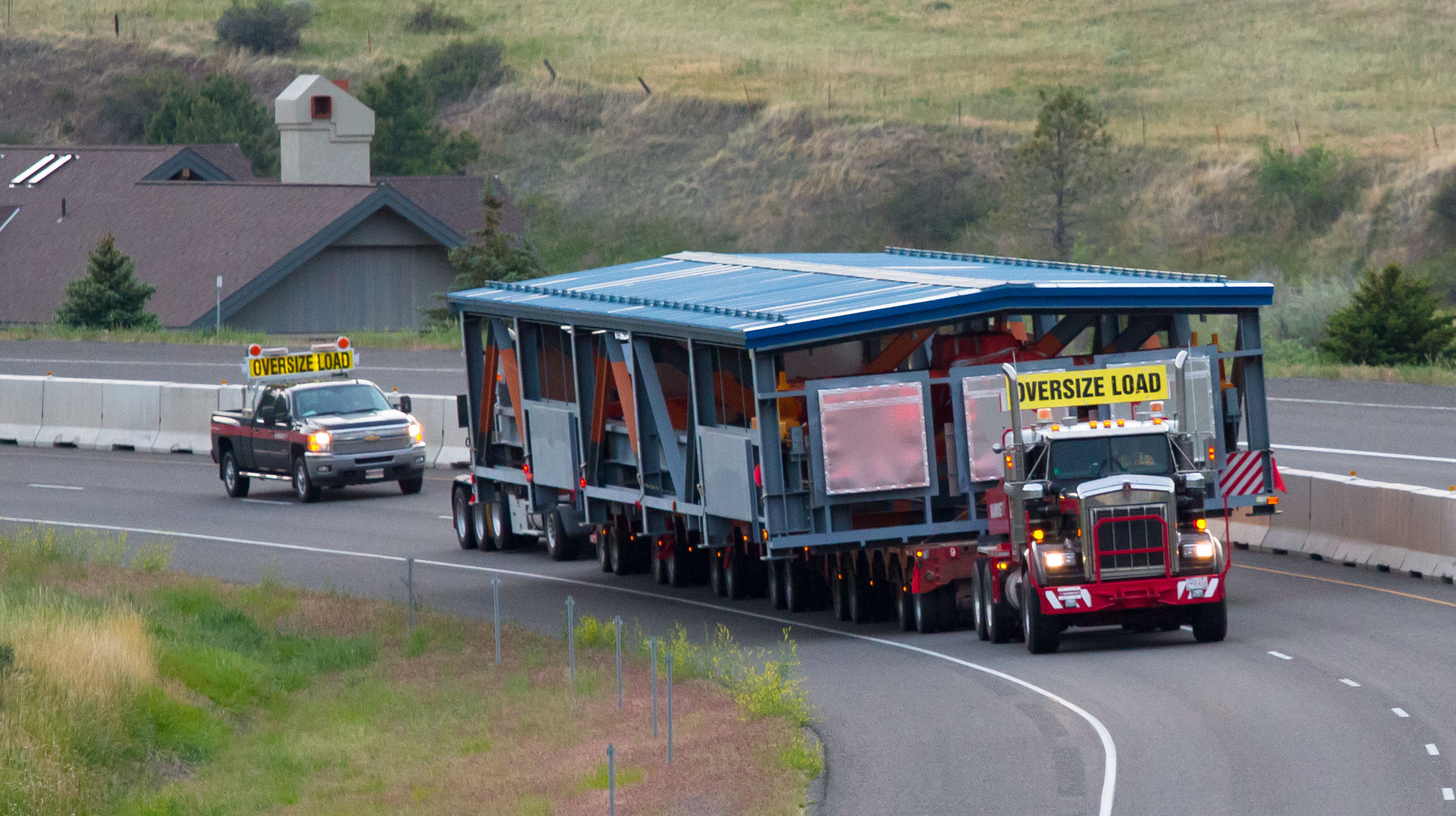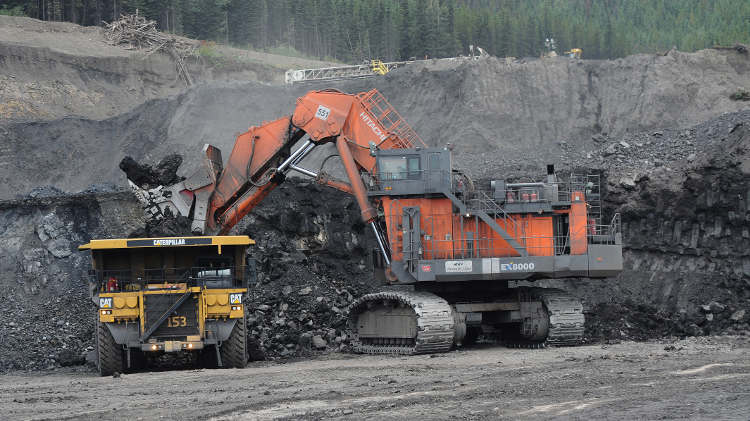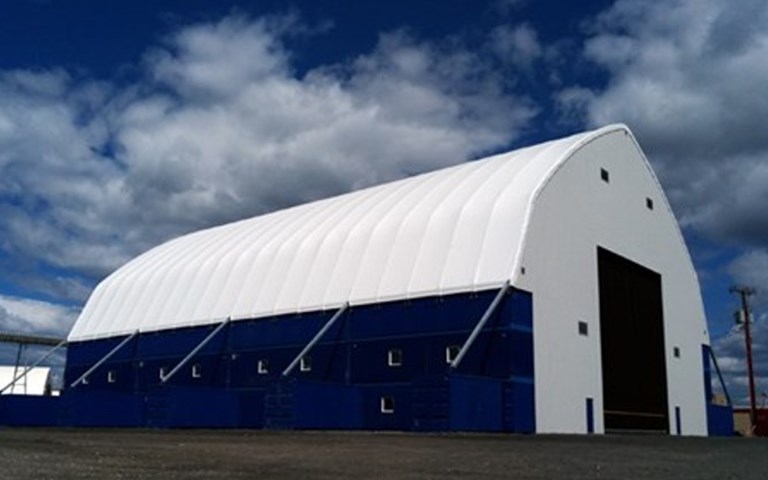Corner Cast’s hybrid structure uses Corten steel shipping containers to support a steel frame covered with synthetic fabric and rests on a compacted gravel pad | Courtesy of Corner Cast
When Cliffs Natural Resources announced it would halve the expansion budget for its Bloom Lake iron ore mine in Quebec in 2014, staff at Corner Cast Construction Inc. and its affiliate Britespan Quebec started to worry. Cliffs put Phase 2 of its expansion on hold indefinitely, and Corner Cast and Britespan were not sure if core expenses would also be cut in tough times. The Montreal-based companies had an agreement with Cliffs to supply a temporary truck shop: an innovative fabric steel hybrid structure they were excited to deploy near Fermont.
The hybrid structure has two main advantages over conventional buildings, according to Magnus Consiglio, partner at Corner Cast. First, it saved significant dollars by eliminating the need to pour concrete on site. “What’s really unique about this is that instead of having a concrete foundation, you use shipping containers as the foundation,” he explains. The Corten steel shipping containers rest on a compacted gravel pad and support a steel frame covered with synthetic fabric, all of it prefabricated and trucked to the client’s site. The shipping containers on both sides of the main structure are outfitted as locker rooms, lunch rooms, offices, washrooms and mechanical rooms.
To accommodate Caterpillar 797 and Komatsu 730E trucks, Bloom Lake’s temporary truck shop required 40-by-40-foot doors and an interior of 160 feet by 100 feet. The containers on each side added another 28 feet of width. It is the biggest hybrid structure Corner Cast – or any company – has built. Consiglio estimates that a similarly sized conventional building would start at roughly twice the price.
The total construction time on site was two months, a fraction of the time it would normally take. Once on site, the containers were sealed or “zipped” together to make a series of smaller rooms connected to open space. Steel supports went up, then the fabric covering, followed by insulation, lighting, heating, doors, steel cladding and other finishing touches. The installation process composed about 30 per cent of the building’s price tag; materials accounted for 65 per cent and truck shipments from factories in Ontario and Quebec added up to five per cent of the total cost.
A recyclable building
A second important advantage is that the modular structure can be disassembled and moved elsewhere on site as needed. Cliffs is currently using the shop for light maintenance on heavy equipment and the building can also be used to assemble new trucks or other tasks that demand a large protected workspace. If no longer needed at its current location, it could be moved to a different spot to continue duty as a maintenance facility. “From what I see, almost everything would be reusable, if we moved it to another area,” says Amélie Dorion, project manager of the operation.
“The fact that mining companies can actually reuse these things later down the line at another location on their facility is really the sales point there,” Consiglio agrees. “It is a very unique kind of a proposition for them to have almost a recyclable building that they can just keep moving from place to place.”
Dorion points out the Britespan fabric covering is divided into sections; if wind damages one section, it can be replaced without touching the rest. The sturdiest components, shipping containers made of weathering steel, have already been repurposed and can be passed on to further sites or clients. For this reason, Corner Cast was awarded a sustainable development prize by Hydro Québec in June 2014.
“With conventional construction you have a huge amount of waste left at the end,” says Consiglio. “You have to do a demolition of the building, and obviously this is not a very sustainable way to do construction.”
Recession breeds innovation
Three years ago, Corner Cast needed to carve its own niche in a difficult, recession-hit market. The company had been building shipping container rooms, thus supplying mining camps with offices and sleeping quarters. But as exploration budgets began to dry up, competition among building suppliers became fierce. Together with a partner in Alberta, Vertical Building Solutions, Corner Cast founders came up with the idea of using furnished shipping containers as the foundation for a fabric roof. “We really had to innovate to succeed in the marketplace,” comments Consiglio.
The Cliffs Bloom lake truck shop is Corner Cast’s third hybrid structure. Although it has sold container units in every province in Canada, the company’s biggest projects to date have stayed in Quebec, where it is a licensed contractor. A team of five to nine people did the majority of the installation work.
But the obvious attraction of shipping containers is that they travel anywhere. “We could be doing these truck assembly shops for the mining industry in South America very easily,” says Consiglio. “That’s why we strongly believe that this will become not just a product for Canada or Quebec, but something that can be exported all over the world.”




